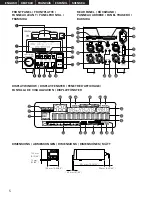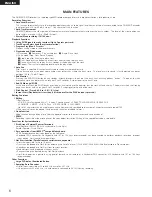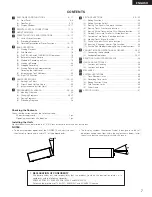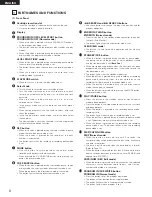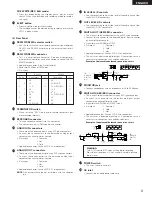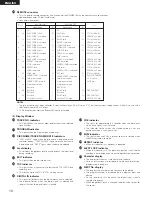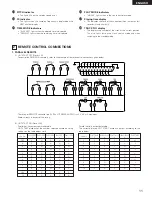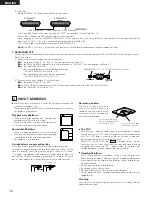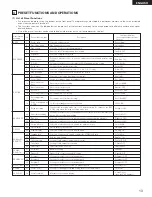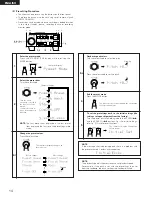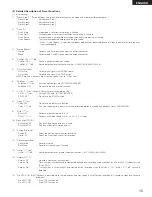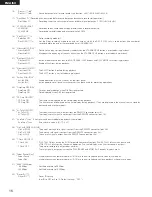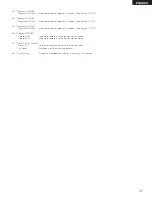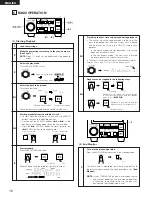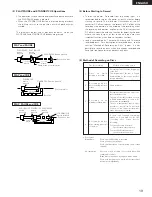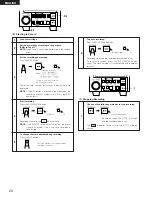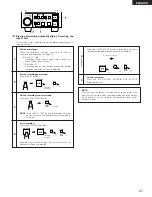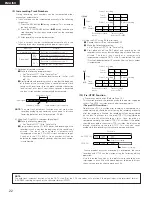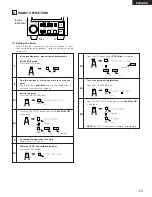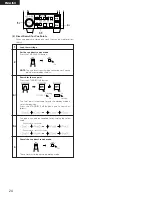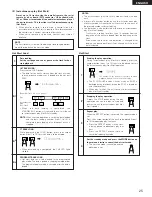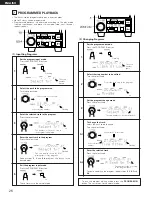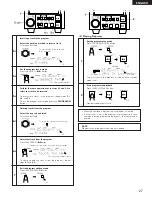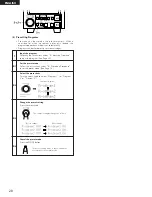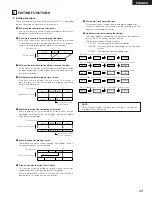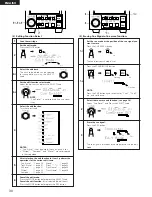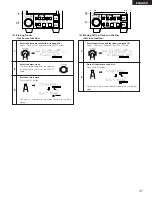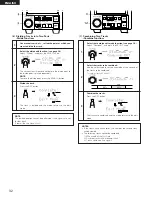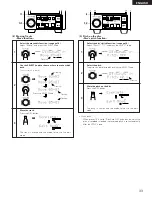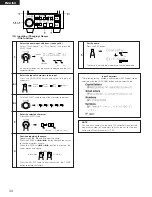
19
ENGLISH
(3) PLAY/PAUSE and STANDBY/CUE Operations
(4) Before Starting to Record
(5) Method of Recording on Discs
• The operation switches between playback and pause each time
the PLAY/PAUSE button is pressed.
• When the STANDBY/CUE button is pressed during playback,
the pickup returns to the position at which playback was
started.
The diagrams below show playback patterns when the
PLAY/PAUSE and STANDBY/CUE buttons are pressed.
PLAY and PAUSE
PLAY/PAUSE button pressed
Position on disc
Section
played
Section
played
PLAY and CUE
PLAY, PAUSE and CUE
Back Cue
STANDBY/CUE button pressed
Position on disc
STANDBY/CUE
button pressed
Position on disc
• Turn on the power. To record from the analog input, it is
recommended to turn on the power at least 5 minutes before
starting to record. This eliminates fluctuations of the A/D
converter DC offset, reduces the amount of DC offset at the
recording start position, in the middle of the recording and at
the recording end position, and keeps the DC offset constant.
DC offset hinders the auto cue function for detecting the point
where the sound starts at low levels and the auto track
increment function which detects soundless sections.
• Load a recordable disc. There are 60-minute and 74-minute
recordable discs. For a description of recordable discs, see the
section “Method of Recording on Discs” below. It is not
possible to record on discs which are already recorded and
have little free space left or on playback only discs.
Disc for recording
Method of recording on disc
1
Discs on which
nothing is recorded
Recording starts from the beginning
of the disc.
The beginning of the disc is found
automatically, so there is no need to
do this manually.
2
Recording on discs
after erasing all their
tracks
Same as above.
3
Recording on an
already recorded disc
Recording starts from the end of the
last recorded section.
The end of the last recorded section
is found automatically, so there is no
need to do this manually.
The set is designed so that it is not
possible to record over a recorded
section, so you cannot accidentally
erase a previous recording.
4
Recording on discs
after erasing part or all
of the disc
If there is not enough remaining
space or if you want to do the
recording over, erase before
recording.
To erase one track at a time:
Use the track erase function.
To erase all the tracks at once:
Use the all erase function.
• Disc types
Blank discs:
Discs on which nothing is recorded
Discs you have just bought
Discs that have been erased (using the all erase
function)
No-track discs:
Discs on which nothing is recorded but which
contain a disc name
Blank discs which have been given a disc name
Discs with disc names on which all the tracks have
been erased individually
PLAY/PAUSE
button
pressed
PLAY/PAUSE
button
pressed
PLAY/PAUSE
button
pressed
Pause mode set at this point
Section
played
PLAY/PAUSE
button
pressed
PLAY/PAUSE
button
pressed
PLAY/PAUSE
button
pressed
Section
played
Section
played

